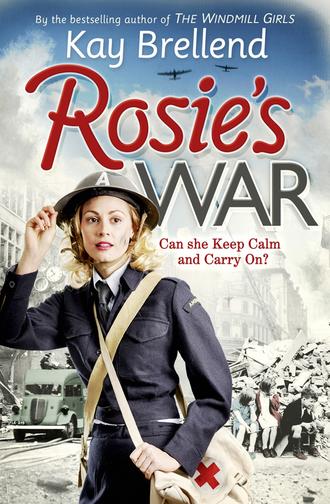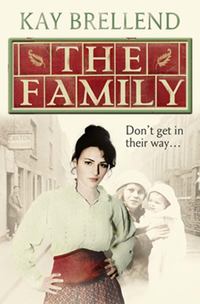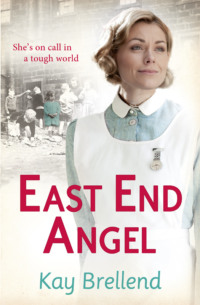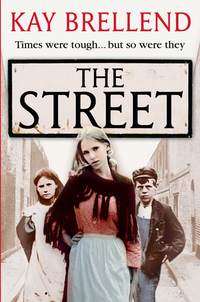
Полная версия
Rosie’s War
Rosie placed the tea tray back on the table. For a moment she stood there, leaning against the wood, the knuckles of her gripping fingers turning white. The baby started to whimper and she automatically went to her. Seated on the sofa she reached a hand backwards to the handle, rocking the pram and avoiding looking at the infant, her chin cupped in a palm. Within a few minutes the room was again quiet. Rosie stood up, drawing her cardigan sleeves down her goose-pimpled arms. She took off her pinafore and folded it, then looked in the coal scuttle, unnecessarily as she knew it would be empty.
It was a cold unwelcoming house for a visitor but it didn’t matter that her father was too thrifty to light the fire till the evening. When Nurse Johnson turned up Rosie intended to say quickly what she had to, then get rid of her so she might start planning her future.
She wandered to the window, peering through the nets for a sighting of the midwife pedalling down the road. It had been many months since she’d hurried from Dr Vernon’s surgery to huddle, crying, in a nearby alleyway. She’d been terrified that day of going home and telling her father the dreadful news that she was almost certainly pregnant, yet he’d taken it better than she had herself. But now, at last, Rosie felt almost content because the prospect of returning to something akin to her old life seemed within her grasp.
Under a year ago she’d been working as a showgirl at the Windmill Theatre. Virtually every waking hour had been crammed with glamour and excitement. She’d enjoyed her job and the companionship of her colleagues, despite the rivalry, but she couldn’t go back there. Her body was different now. Her breasts had lost their pert youthfulness and her belly and hips were flabby. Besides, Rosie felt that chapter of her life had closed and a new one was opening up. Whether she’d wanted to or not, she’d grown up. The teenage vamp who’d revelled in having lavish compliments while flirting with the servicemen who flocked to the shows, no longer existed. Wistfully Rosie acknowledged that she’d not had a chance to kiss goodbye to that sunny side of her character. That choice, and her virginity, had been brutally stolen from her by Lenny, damn the bastard to hell …
But once her daughter was adopted Rosie knew she’d find work again, and she wanted her own place. Her father’s future wife resented her being around and Rosie knew she’d probably feel the same if she were in Doris’s shoes.
Suddenly she snapped out of her daydream, having spotted Nurse Johnson’s dark cap at the end of the street. Rosie let the curtain fall and pulled the pram out from behind the sofa so the midwife could examine the baby. Although she was expecting it, the ratatat startled her. Rosie brushed herself down then quickly went to open the door, praying that her father wouldn’t reappear to embarrass her by making snide comments.
Half an hour later the examinations were over and Rosie was sitting comfortably in the front parlour with the midwife.
‘She’s a beautiful child but would benefit from breast milk rather than a bottle, Mrs Deane. She might put on a bit more weight.’
Rosie smiled weakly; she hated people calling her by the wrong name. Her father and Doris had persuaded her to pass herself off as a war widow to stop tongues wagging. But that hadn’t worked: the old biddies were still having a field day at her expense. Rosie had chosen to use her mother’s maiden name as her pretend married name. She cleared her throat. ‘What we spoke about last time, Nurse Johnson …’
Trudy Johnson put down her pen on the chart she’d been filling in. ‘You still want to have her adopted?’ she prompted when Rosie seemed stuck for words.
‘I do … yes …’
‘Why? You seem to be coping well, and you have your father’s support.’
‘I’m not married,’ Rosie blurted, although she was sure the midwife had already guessed the truth. ‘That is … I’m not widowed either … I’ve never had a husband.’
Trudy sat back in the chair. It wasn’t surprising news, but Rosie’s honesty had taken her aback. Families who were frightened of ostracism often came up with non-existent husbands to prevent a daughter’s shame tainting them all. And now it was clearer why the baby still hadn’t been named. Much of the falsehood surrounding illegitimate births unravelled when awkward questions were asked at the registry office.
‘I guessed perhaps that might be the case.’
‘You don’t know the ins and outs of it all.’ Rosie bristled at the older woman’s tone. ‘Nobody does except me and Dad.’
Trudy Johnson could have barked a laugh at that. Instead she put away her notes in the satchel at her feet. At least this young woman had had the guts to go through with it, whereas lots of desperate girls allowed a backstreet butcher to rip at their insides. She had been approached herself over the years by more than one distraught family to terminate a ‘problem’ for them. Trudy had always refused to abort a woman’s baby but it didn’t stop them going elsewhere. And, to Trudy’s knowledge, at least two of those youngsters had ended up in the cemetery because of it.
‘Your situation’s more common than you think.’ Again Trudy’s tone was brisk. ‘Unlike you, though, I’ve seen some poor souls turfed out onto the streets with their babies. Your father is keeping a roof over your heads.’
‘It’s the least he can do, considering …’ Rosie bit her lip; she’d said enough. Besides, she didn’t want to get sidetracked from the important task of finding her daughter a new home.
Trudy stood up, buckling her mac, and gazed into the pram. The baby was awake. She’d been just five pounds at birth and was struggling to put on weight. Arms and legs barely bigger than Trudy’s thumbs were quivering and jerking, and just a hint of a smile was lifting a corner of the little girl’s mouth. It was probably wind but Trudy tickled the adorable infant under the chin.
‘I want her adopted,’ Rosie stated firmly. ‘And I want it done soon, before she gets attached to us.’
‘If you’re sure that’s what you want to do, then I’ll have her. I’ve never been married but I’ve always wanted a child.’ Trudy sent Rosie a sideways smile. ‘I almost got married when I was seventeen but …’ She shrugged. Her memories of Tony were too precious to share. She even avoided talking about her dead lover with her elderly parents. They’d liked him, and had mourned his passing almost as much as she had herself.
‘I see … sorry …’ Rosie finally murmured, recovering from her shock. On reflection she realised that the child would probably get no better care than from someone with Nurse Johnson’s skills. ‘Will having a baby interfere with your work?’ Rosie didn’t think that the midwife would leave a tiny baby for long periods of time, yet neither did she expect the woman would pack in her vocation just like that.
‘I share shifts with other nurses and know a good nursery,’ Nurse Johnson explained.
‘I’m not sure …’ Rosie felt awkward. She didn’t want to upset Nurse Johnson but her intention had always been that her baby be taken into a family where she could be mothered properly. Then in the evenings the woman’s doting husband would come home from work to coo over his new daughter. ‘I’ll think about it and I’d better let Dad know, too,’ Rosie said slowly, avoiding the older woman’s eye.
‘Of course …’ Trudy withdrew her hand from the pram. It wasn’t the first time that she’d attempted to foster a child only to be shunned because of her age and spinster status.
‘Did your sweetheart ever get married?’ Rosie blurted, keen to change the subject.
‘He lost his life in the Great War. He was too young to join up, but he went anyway. Lots did. He was killed at Ypres, still eighteen. I’ve grown old without him.’
‘You met nobody else?’ Rosie asked, saddened but still inquisitive.
‘I’d have liked to find somebody, but so many young fellows of my generation are still in Flanders, aren’t they?’ Nurse Johnson’s expression turned rather severe, as though she regretted betraying her feelings. ‘Does your father agree with your plan for adoption?’
‘It’s up to me to decide what’s best for her,’ Rosie blurted. ‘He doesn’t like the gossip going round, in any case.’
‘Neighbours chinwagging?’ Nurse Johnson asked with a slight smile.
‘They’ve been told I’m Mrs Deane, too, but they’re not green. I did go away and live with my aunt in Walthamstow for a few months, so I could say I’d had a whirlwind wedding before he bought it overseas.’ She smiled. ‘I’ve already had a run-in with Mrs Price; I don’t suppose it’ll be the last time.’ She frowned. ‘I’m going to find work that takes me away somewhere. Then I can start afresh and Dad’ll marry his fiancée …’ Rosie glanced at the midwife. She was not a bad sort. She’d not turned sniffy on knowing the baby was illegitimate. Neither had she gone off in a huff when her offer to take the baby hadn’t been snapped up. ‘I think you’d make a good mum,’ Rosie said kindly. ‘Good enough for me, anyhow,’ she added on impulse.
‘You mean … shall I start to make arrangements for myself then?’ Trudy’s eyes had lit up, her voice shrill with emotion.
‘I’m glad it’s you.’ Rosie sounded more enthusiastic than she felt. ‘I only want the best for her, you know.’
‘I know you do, dear.’ Nurse Johnson stood up and Rosie did too. They took a step towards one another as though they might embrace but instead shook hands just as the baby started to cry.
‘She takes her bottle without any trouble,’ Rosie informed the midwife quickly. She’d never wanted to feel a soft pink cheek against her naked breast and the baby gazing up at her with steady, inquisitive eyes.
Rosie glanced down and noticed that her clothing was wet.
‘You’ll need to bind yourself up, dear.’ Trudy nodded at the damp patches on Rosie’s bodice.
‘I know … it’s a right nuisance.’ Rosie frowned, grabbed the pinafore and put it on again, hiding the stains on her blouse. ‘How long will it all take … the adoption?’
‘You’re sure you don’t want to think about it for longer?’ Trudy felt conscience-bound to ask although she prayed Rosie wouldn’t back out now when she was considering Angela as a lovely name for such a blonde cherub.
Rosie nodded vigorously. ‘I’d offer you tea, but I’ve a pile of ironing to do.’ There were only two of her father’s shirts and one of her blouses in the basket, but Rosie wanted the woman gone. She felt a strange raging emotion within that was making her want to sink to her knees and scream. She guessed her conscience was troubling her but she mustn’t let it. Her father might accuse her of being selfish and heartless, but she truly wanted the best for her daughter.
‘It’s all right … I’ve got to get on too.’ Trudy realised that the young woman wanted to be on her own now. With a surreptitious look of longing at the baby, she gathered up her things and followed Rosie towards the front door.
CHAPTER THREE
‘Gone has she, the interfering old bag?’
Her father must have been waiting for the midwife to leave. He’d emerged from the cellar almost before Rosie had shut the front door, having seen the woman out.
‘Yes, she has … but you’ve no need to speak about her like that. She’s all right, is Nurse Johnson.’ Rosie knew that crossed-armed, jaw-jutting stance of her father’s meant another row was in the offing. He was likely to hit the roof when he found out what arrangements she’d made, and spit out a few more choice names for the nice nurse.
‘Go and see if little ’un’s all right, shall I?’
‘She’s fast asleep; I’ve only just come out of the bloody front room and you know it,’ Rosie retorted in response to his cantankerous sarcasm.
‘How long are we going to keep calling the poor little mite “she”? Getting a name, is she, before her first birthday?’ John continued sourly.
His barbs were starting to get on Rosie’s nerves but she reined in her temper. They had a serious conversation in front of them and she’d as soon get it over with. ‘Come and sit down in the kitchen, Dad. There’s something I’ve got to tell you.’
Rosie took her father’s elbow and, surprisingly, he allowed her to steer him along the passage.
‘Let’s wet our whistles.’ Rosie began filling the kettle, hoping to keep things calm if not harmonious between them.
John pulled out a stick-back chair at the kitchen table and was about to sit down when he hesitated and glanced up at the ceiling. Rosie had heard it too: the unmistakable sound of aeroplane engines moving closer.
‘Must be some of ours,’ Rosie said, putting the kettle on the gas stove and sticking a lit match beneath it.
There’d been no warning siren and the afternoon was late but still light. The Luftwaffe mostly came over under cover of darkness. Since the Blitz petered out last May, German bombing had thankfully become sporadic and Londoners – especially East Enders who’d borne the brunt of the pounding – had been able to relax a bit.
John peered out of the window, then, frowning, he opened the back door and stepped out, head tipped up as he sauntered along the garden path. His mouth suddenly fell agape in a mixture of shock and fear and he pelted back towards the house, shouting.
But the sirens had belatedly begun to wail, cutting off his warning of an air raid.
Rosie let the crockery crash back to the draining board on hearing the eerie sound and sprang to the back door to hurry her father inside. Before John could reach the house a short whistle preceded an explosion in a neighbour’s garden, sending him to the ground, crucified on the concrete at the side of the privy.
Crouching on the threshold, arms covering her head in instinctive protection, Rosie could hear her father groaning just yards away. She’d begun to unfold to rush to him when debilitating terror hit her. She sank back, shaking and whimpering, biting down ferociously on her lower lip to try to still her chattering teeth. Tasting and smelling the metallic coppery blood on her tongue increased the horrific images spinning inside her head. She rammed her fists against her eyes but she couldn’t shut out the carnage she’d witnessed in the Café de Paris a year ago. Her nostrils were again filled with the sickly stench of blood, and her mind seemed to echo with the sounds of wretched people battling for their final moments of life. Some had called in vain for loved ones … or the release of death. Limbless bodies and staring sightless eyes had been everywhere, tripping her up as she’d fled to the street, smothered in choking dust. For months afterwards she’d felt dreadfully ashamed that she’d instinctively charged to safety rather than staying to comfort some of those poor souls.
‘Rosie … can you hear me …?’
Her father’s croaking finally penetrated Rosie’s torment and she scrambled forward, uncaring of glass and wood splinters tearing into her hands and knees. She raked her eyes over him for injuries, noting his bloodied shin, although something else was nagging at her that refused to be dragged to the forefront of her mind.
‘Think me leg’s had it,’ John cried as his daughter bent over him.
Rosie was darting fearful looks at the sky in case a second attack was imminent. The bomber had disappeared from view, but another could follow at any moment and drop its lethal load. Obliquely Rosie was aware of neighbours shouting hysterically in the street as they ran for the shelters, but she had to focus on her father and how she could get him to safety in their cellar.
‘Take my arm, Dad … you must!’ she cried as he tried to curl into a protective ball on hearing another engine. Thank goodness this aeroplane, now overhead, was a British Spitfire on the tail of the Dornier. ‘Come on … we can make it … one of ours is after that damned Kraut.’ Rosie felt boosted by the fighter avenging them and murmured a little prayer for the pilot’s safety as well as their own. But then her attention was fully occupied in getting her father to cooperate in standing up. He was slowly conquering his fear and squirming to a seated position with her assistance.
Regaining her strength, she half-lifted him, her arm and leg muscles in agony and feeling as though they were tearing from their anchoring bones. Gritting her teeth, she managed to get both herself and her father upright. With her arm about his waist she dragged him, limping, into the kitchen. John Gardiner wasn’t a big man; he was short and wiry but heavy for a girl weighing under eight stone to manhandle.
Slowly and awkwardly they descended the stairs to the cellar, crashing onto the musky floor two steps from the bottom when Rosie’s strength gave out. John gave a shriek of pain as he landed awkwardly, attempting to break his daughter’s fall while protecting his injured limb.
Rosie scrambled up in the dark, dank space and lit the lamp, then crouched down in front of her father to inspect him. The explosion had left his clothes in rags. Gingerly she lifted the ribbons of his trouser leg to expose the damage beneath. His shin was grazed and bloody and without a doubt broken. The bump beneath the flesh showed the bone was close to penetrating the skin’s surface.
Her father’s ashen features were screwed up in agony and Rosie noticed tears squeezing between his stubby lashes. She soothed him as he suddenly bellowed in pain.
‘Soon as it’s over I’ll go and get you help,’ she vowed. ‘We’ll be all right, Dad, we always are, aren’t we?’ She desperately wanted to believe what she was saying.
Rosie thumped the heel of her hand on her forehead to beat out the tormenting memories of the Café de Paris bombing. It seemed a very long while ago that she’d gone out with two of her friends from the Windmill Theatre for a jolly time drinking and dancing to ‘Snakehip’ Johnson’s band, and the night had ended in a tragedy. Three of them had entered the Café de Paris in high spirits but only two of them had got out alive.
Rosie forced the memories out of her mind. She sprang up and dragged one of the mattresses, kept there for use in the night-time air raids, closer to her father, then helped him roll off the floor and on to it to make him more comfortable. There was some bedding, too, and she unfolded a blanket and settled it over him, then placed a pillow beneath his head.
Sinking down beside her father, Rosie pressed her quaking torso against her knees, her arms over her head as the house rocked on its foundations. Another bomber must have evaded the Spitfire to shed its deadly cargo.
‘We’ve taken a belting … that’s this place finished … we’ll need a new place to live,’ John wheezed out between gasps of pain, his voice almost drowned out by the crashing of collapsing timbers and shattering glass. ‘Come here, Rosie.’ He held out his arms. ‘If we’re gonners I want to give you a last cuddle. Be brave, dear … I love you, y’know.’
They clung together, terrified, the smell of John’s blood and sweaty fear mingling in Rosie’s nostrils. After what seemed like an hour but was probably no more than a few minutes the dreadful sounds of destruction faded and the tension went out of John. Pulling free of his daughter’s embrace he flopped back on the mattress, breathing hard.
‘That’s it over then, if we’re lucky. Everything seemed all right while we still had this place.’
Rosie knew what her father meant. This had been the house her parents had lived in from when they were married, and it was Rosie’s childhood home. Wincing as she picked a shard of glass from her knee, Rosie mentally reviewed their options. Doris lived in Hackney and she might let them stay with her until the housing department found them something. Then Rosie remembered the woman had stomped out, making it clear she wasn’t getting landed with kids …
As though the memory drifted back through a fog in her mind Rosie realised that it wasn’t just her and Dad any more. Her baby was upstairs. She’d saved her own skin and her father’s, oblivious to the fact that there were three of them now. Her little girl was all alone and defenceless in the front room and she’d not even remembered her, let alone made an effort to protect her from the bombing.
Rosie pushed herself to her feet. She stood for less than a second garnering energy and breath, then launched herself up the cellar steps, her hands and knees bloodied in the steep scramble as she lost her footing on the bricks in her insane haste. The door was open a few inches and she flew into it to run out but something had fallen at the other side, jamming it ajar. With a feral cry of fury Rosie barged her arm again and again into the door until it moved slightly and she could squeeze through the aperture. Frenziedly she kicked at the obstacles blocking her way.
Masonry from the shattered kitchen wall was piled in the hallway but she bounded over it, falling to her knees as the debris underfoot shifted, then jumping back up immediately. She’d no need to fight her way into the front room. The door had fallen flat and taken the surround and some of the plaster with it.
Rosie burst in, her chest heaving. The top of the pram was covered in rubble and a part of the window frame, jagged with glass, lay on the hood.
Flinging off the broken timbers, she swept away debris with hands and forearms, uncaring of the glass fragments ripping into her flesh. Oozing blood became caked with dust, forming thick calluses on her palms.
Hot tears streamed wide tracks down her mucky face as finally she gazed into the pram. Very carefully she put down the hood, and removed the rain cover. She was alive! Rosie picked up her daughter, wrapped in her white shawl, and breathed in the baby’s milky scent, burying her stained face against soft warm skin until the infant whimpered in protest at the vice-like embrace.
‘Thank you, God … oh, thank you …’ Rosie keened over and over again as the white shawl turned pink in her cut hands. She bent over the tiny baby as though she would again absorb her daughter into herself to keep her safe. Her quaking fingers raced up and down the little limbs, checking for damage, but the infant’s gurgling didn’t seem to be prompted by pain.
‘Let’s go and find Granddad, shall we?’ Rosie softly hiccuped against her daughter’s downy head. ‘Come on then, my darling. I’m so sorry; I swear I’ll never ever leave you again.’
When she pushed open the cellar door Rosie found her father had crawled to the bottom step and was in the process of pulling himself up it. He choked on a sob as he saw them, flopping back down against the wall.
‘I forgot about her, too,’ he gasped through his tears. ‘What sort of people are we to do something like that?’ He shook his head in despair, wailing louder. ‘It’s my fault. I was too concerned about meself to even think about saving me granddaughter.’
‘It’s all right, Dad. She’s fine, look …’ Rosie anchored the baby against her shoulder in a firm grip, then descended as quickly as she could, hanging onto the handrail. ‘Look, Dad!’ she comforted her howling father. Gently she unwrapped the child to show her father that the baby was unharmed. ‘We’re not used to having her around yet … that’s all it is. No harm done. She’s in better shape than us,’ Rosie croaked. She felt a fraud for trying to make light of it when her heart was still thudding crazily with guilt and shame.
John blew his nose. For a long moment he simply stared at his granddaughter, then he turned his head. ‘Can see now that you’re right, Rosie,’ he started gruffly. ‘She’d be better off elsewhere. Let somebody else care for her, ’cos we ain’t up to it, that’s for sure.’
Somewhere in the distance was a muffled explosion, but neither John nor Rosie heeded it, both lost in their own thoughts. Rosie settled down on the mattress. Her lips traced her daughter’s hairline, soothing the baby as she became restless. She placed the tiny bundle down beside her and covered her in a blanket, tucking the sides in carefully.
John studied his wristwatch. ‘Time for her bottle. I’ll watch her if you want to go and get it.’ Muffling moans of pain, he wriggled closer to peer at the baby’s dust-smudged face. He took out from a pocket his screwed-up hanky.
‘No! Don’t use that, Dad. It’s filthy; I’ll wash her properly later … when we go upstairs.’ Rosie smiled to show her father she appreciated his concern. But she wasn’t having him wiping her precious daughter’s face with his snot rag.






